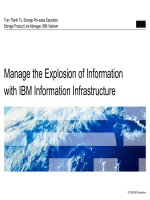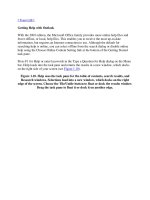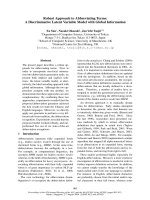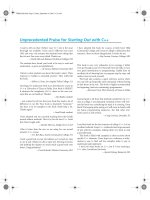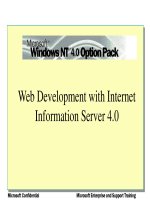Reaching Out with Outlook Information
Bạn đang xem bản rút gọn của tài liệu. Xem và tải ngay bản đầy đủ của tài liệu tại đây (1.54 MB, 5 trang )
Journal of Applied Communications
Volume 69
Issue 2
Article 5
Reaching Out with Outlook Information
Sherrill Carlson
Follow this and additional works at: />
This work is licensed under a Creative Commons Attribution-Noncommercial-Share Alike 4.0
License.
Recommended Citation
Carlson, Sherrill (1986) "Reaching Out with Outlook Information," Journal of Applied Communications: Vol.
69: Iss. 2. />
This Research is brought to you for free and open access by New Prairie Press. It has been accepted for inclusion
in Journal of Applied Communications by an authorized administrator of New Prairie Press. For more information,
please contact
Reaching Out with Outlook Information
Abstract
Reaching a large number of agricultural producers, the agricultural business/financial community and the
public with agricultural outlook information sounds like one of those grandiose educational ideas that
never have much reality beyond the pages of the annual plan of work.
This research is available in Journal of Applied Communications: />
Carlson: Reaching Out with Outlook Information
Reaching Out with Outlook Information
Sherrill Carlson
Reaching a large number of agricultural producers, the
agricultural business/financial community and the public with
agricultural outlook information sounds like one of those gran~
diose educational ideas that never have much reality beyond
the pages of the annual plan of work. However, in the three
Pacific Northwest states (Washington, Idaho and Oregon), this
idea has a great deal of reality. It's called the Pacific Northwest Agricultural Situation and Outlook report. The report is
issued annually as a 16-page tabloid insert in the biweekly
farm magazine for each of the three states. It runs in the first
edition of the new calendar year and is the basis for advance
spinoffs for the news media in both written and audio form .
Preparation
Preparation involves 40 to 50 faculty members at the
University of Idaho, Oregon State University, and Washington
State University. Some are classroom teachers, some are Ex·
tension specialists , and some are county Extension agents.
They serve as writers or reviewers of 16 to 18 articles covering a wide range of commodities and general subjects, such
as international trade or the outlook for production inputs. A
coordinating committee of three Extension economists, one
from each state, leads the effort. Chairmanship rotates from
state to state each year. The effort also involves publications,
news, and broadcast personnel in the three states.
The publications unit in the chairing state edits the report.
The copy is received electronically from the three campuses
and several outlying offices. All three states have electronic
mail/computer linkups that can interface. The articles are
edited and sometimes trimmed to fit available space, then
sent electronically to the headquarters for the FarmerStockman group, which publishes biweekly state farm
magazines for six western states.
The author Is publications coordinator for the College of
Agriculture and Home Economics, Washington State
University. Pullman.
19
Published by New Prairie Press, 2017
1
Journal of Applied Communications, Vol. 69, Iss. 2 [1986], Art. 5
The magazine's production staff handles typesetting, final
makeup, and proofreading. The headquarters are in Spokane,
Washington , so a university editor- can give the proof a final
check when Washington or Idaho are the lead states; Oregon
is too remote. The newsprint insert is then run on the presses
of the two Spokane daily newspapers, using ROP second
color. It reaches magazine subscribers two weeks after the
edited copy is wired in.
Story Use Extensive
At the same time , the edited articles are delivered to the
three university agricultural news units. Each state prepares
its own news releases to fit local conditions and maximize
story use. Story use has been extensive. Outlook information
has a number of news values-new, current, important, local,
authoritative. The widespread usage is also due in some part
to the need to fill the news hole that occurs right after
Christmas. The smaller dailies print all or parts of the
releases with little rewriting . The metro press uses the copy
as the springboard for its own rewrites. The agriculture col·
lege radio news services also prepare written and audiotape
spinoffs, featuring actualities with the experts who wrote the
articles.
The complexity of Pacific Northwest agriculture means that
a large number of articles and releases are needed. The 1986
outlook report , issued the first week in January, dealt with a
whole catalog of commodities: wheat and feed grains, dry
peas, lentils, hay and forage , grass seed, apples, pears, small
fruits, nuts, vegetables, potatoes, sugarbeets , dry beans,
onions, beef cattle, hogs, sheep, poultry, seafood , dairy,
forest products, and nursery products. General articles
covered the financial crisis in agriculture , the general econ·
omy, international trade, and the outlook for farm production
inputs.
Less Than 8 Cents
The direct cost for the 1~page tabloid insert is less than 8
cents per copy. For this , the universities receive total control
of contents and appearance plus delivery to each of the
magazine's 70,000 subscribers in Idaho, Oregon, and
Washington. The cost is shared on the basis of circulation in
each state.
/>DOI: 10.4148/1051-0834.1610
20
2
Carlson: Reaching Out with Outlook Information
The Pacific Northwest outlook project began with the 1976
edition and has evolved in several stages. The impetus came
from the agriculture deans and agricultural economics chairs
at the three schools , who wanted to share resources and
selected outlook work as one of the major cooperative projects in Extension. Early copies were printed in the Pacific
Northwest Extension publication series; they were 24-page
booklets available through county Extension offices. Press
runs never exceeded 15,000 copies, with direct costs of up to
30 cents per copy. These costs do not include distribution
and mailing.
During the early years, successful experience with spinoff
news stories convinced the three states of the value of the
news tie-in, although it took several years to establish a threestate effort.
The outlook project was switched to magazine inserts
beginning with the 1984 edition. The Farmer-Stockman
magazines have the broadest farm and agribusiness audience
in the region. They could provide a much larger audience, a
turnaround time that equaled the Pacific Northwest schedule,
and the benefit of delivery to the individual reader-all at a
lower cost per copy, although total costs went up.
Radio news coverage was added in Washington and Idaho
for the 1985 and 1986 editions via toll-free, dial-in services.
The 1986 insert was the first to be produced electronically
rather than from hard copy, greatly simplifyng typesetting and
proofing.
Tom Henry, Farmer-Stockman editor, likes being able to
offer the outlook insert to his Pacific Northwest readers. He
mentions specifically the number of favorable comments his
editors receive when in the field . However, the insert has its
own visual identity, and should retain strong identification for
the three sponsoring universities.
Published by New Prairie Press, 2017
21
3
